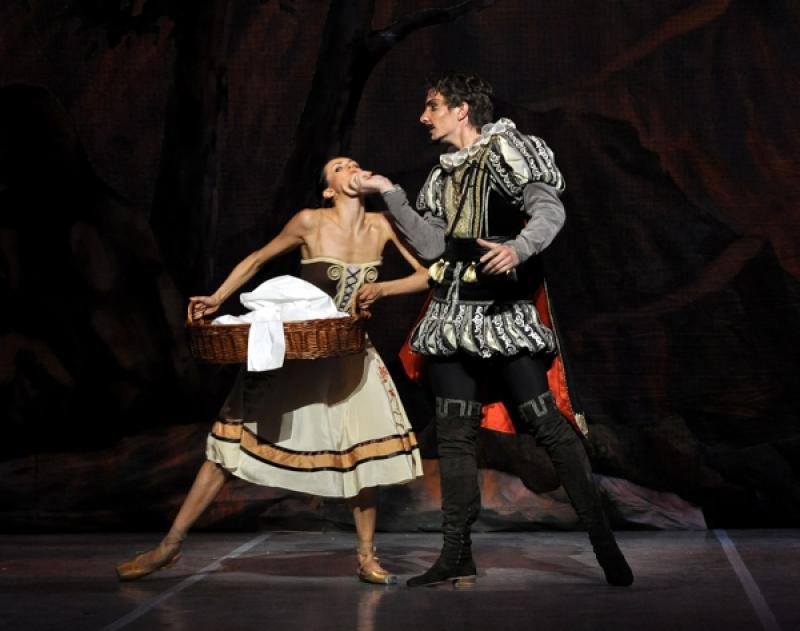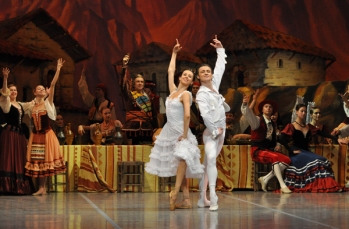Laurencia, Mikhailovsky Ballet, London Coliseum | reviews, news & interviews
Laurencia, Mikhailovsky Ballet, London Coliseum
Laurencia, Mikhailovsky Ballet, London Coliseum
Another hero, another peasant revolt, but these Russians offer surprises

Rape, marauding soldiers, peasants on the warpath and a flash hero - are we at the Bolshoi’s Spartacus once again? No, we’re at the Mikhailovsky Ballet down the road at the Coliseum where a rather more Erroll Flynn-type spectacle is being offered, Laurencia.
It’s set in Spain, based on Lope da Vega’s 17th-century peasant revenge tragedy Fuente Ovejuna in as serious a way as Don Q is based on Cervantes. Ie, the great literary work is a McGuffin for dancing. Like Don Q it has a perky boy and girl ready to flirt and leap all the way to their wedding, but this time the invading aristocrat is less benevolent. He is the vain and hideously moustached Grand Commander of the Order of Calatrava, Don Fernán Gómez, a symbol of every corruption in the West (Mikhail Venshchikov a dead ringer for Lord Edmund Blackadder), and his mind is fixed on harvesting pretty proletarian girls.
However, he has to contend against the high-flying legs of the dashing role originated by the ballet’s creator, the USSR’s first real male superstar Vakhtang Chabukiani, and a leading lady once incarnated by the two über-ballerinas Natalia Dudinskaya and Maya Plisetskaya. So unlike Spartacus we know whose head is going to end up on a halberd, and it isn’t Erroll Flynn’s.
In 1939 this ballet was a monster hit, and remained so for decades - there is some Fifties film of it showing Chabukiani’s muscular gipsy charms crackling over the celluloid more than half a century later. His solos have idiosyncratic folkloric heft to them, rather than classical finesse, yet his choreography delivers the expected classical refinements for the side couples. Nureyev loved the ballet (see video below), and even staged parts of it for the Royal Ballet. This new staging by the Mikhailovsky is a restorative adaptation by their artistic director Mikhail Messerer: restorative, in that it brings back to view a work that had become a tainted relic of the Soviet old-hat which Grigorovich's Spartacus rallied the modernist forces to fight, and adaptation in that Messerer has stitched it together from several variant productions.
 But enough sober history. Is Laurencia an intoxicating night out with the stars? Not quite. Its first problem is its music. By the 20th century, spoiled by Tchaikovsky, Prokofiev and Rimsky-Korsakov, one's expecting superior sounds in ballet, while this is sub-Khachaturian by a compositional footsoldier Alexander Krein, smudgy music with Hispanic flavour but not real Spanish rhythms, and with strange foretastes of the Spartacus themes to come 20 years later from the younger Khachaturian. As for some of those waltzes in the Act 2 wedding scene, don't they sound suspiciously 19th-century and European? So musically this is inconsequential by comparison with Rimsky-Korsakov and Khachaturian, let alone Prokofiev (and not even as effective as Asafiev). Valery Ovsyanikov was conducting last night, rather sceptically, I thought.
But enough sober history. Is Laurencia an intoxicating night out with the stars? Not quite. Its first problem is its music. By the 20th century, spoiled by Tchaikovsky, Prokofiev and Rimsky-Korsakov, one's expecting superior sounds in ballet, while this is sub-Khachaturian by a compositional footsoldier Alexander Krein, smudgy music with Hispanic flavour but not real Spanish rhythms, and with strange foretastes of the Spartacus themes to come 20 years later from the younger Khachaturian. As for some of those waltzes in the Act 2 wedding scene, don't they sound suspiciously 19th-century and European? So musically this is inconsequential by comparison with Rimsky-Korsakov and Khachaturian, let alone Prokofiev (and not even as effective as Asafiev). Valery Ovsyanikov was conducting last night, rather sceptically, I thought.
Also, if the Mikhailovsky have proved one thing about their natural company style, it is discretion and good taste, not the kind of rumbustious smack and kick that this ballet calls for. When choreography isn’t great, you need a pair of knock-out performances even more, and while Denis Matvienko delivered eager fervour and some bravura in his many double tours en l'air, and Irina Perren was a ravishing Laurencia, their grace as a couple appeared to me too restrained, even criminally subtle, compared with the blazing fragments of Chabukiani film that flickered like ghosts over the curtain between scenes. (Pictured above, Perren and Matvienko: photograph John Ross)
For the desirable combination of Bolshoi-esque blatancy and orientally tapered finger and toe, Sabina Yapparova scored top female points, while Oksana Bondareva had a whale of an acting scene as a rape victim, all torn skirts, tumbling hair, and hands clutching the skies. Next to this kind of full-on approach, Perren, a beautifully gentle Giselle last week, appeared the least likely rabble-rouser of the three.
How this enjoyably retro piece fits into Russian ballet history is understood; whether outside Russia it will travel robustly beyond the drawer marked “Old Postcards” I doubt. But still, the Mikhailovsky Ballet has done bravely on this tour in its programming as far as balletomanes are concerned: offering a trail of discoveries and some handy company dancing. Their attitude seems refreshingly directed towards artistic surprises rather than box office predictability, and of what other Russian company can one say that nowadays?
Video of Rudolf Nureyev and Ninel Kurgapkina ina 1959 festival performance (with Yuri Soloviev and Tatiana Legat, now the Mikhailovsky’s coach, in the supporting quartet):
- The Mikhailovsky Ballet perform Chabukiani's Laurencia again tonight, then Swan Lake (tomorrow-Sunday) and Cipollino, a children's ballet on Saturday afternoon, all at the London Coliseum
- theartsdesk interview with Mikhail Messerer about his restorations of Swan Lake and Laurencia
Share this article
The future of Arts Journalism
You can stop theartsdesk.com closing!
We urgently need financing to survive. Our fundraising drive has thus far raised £49,000 but we need to reach £100,000 or we will be forced to close. Please contribute here: https://gofund.me/c3f6033d
And if you can forward this information to anyone who might assist, we’d be grateful.

Subscribe to theartsdesk.com
Thank you for continuing to read our work on theartsdesk.com. For unlimited access to every article in its entirety, including our archive of more than 15,000 pieces, we're asking for £5 per month or £40 per year. We feel it's a very good deal, and hope you do too.
To take a subscription now simply click here.
And if you're looking for that extra gift for a friend or family member, why not treat them to a theartsdesk.com gift subscription?
more Dance
 'We are bowled over!' Thank you for your messages of love and support
Much-appreciated words of commendation from readers and the cultural community
'We are bowled over!' Thank you for your messages of love and support
Much-appreciated words of commendation from readers and the cultural community
 R:Evolution, English National Ballet, Sadler's Wells review - a vibrant survey of ballet in four acts
ENB set the bar high with this mixed bill, but they meet its challenges thrillingly
R:Evolution, English National Ballet, Sadler's Wells review - a vibrant survey of ballet in four acts
ENB set the bar high with this mixed bill, but they meet its challenges thrillingly
 Like Water for Chocolate, Royal Ballet review - splendid dancing and sets, but there's too much plot
Christopher Wheeldon's version looks great but is too muddling to connect with fully
Like Water for Chocolate, Royal Ballet review - splendid dancing and sets, but there's too much plot
Christopher Wheeldon's version looks great but is too muddling to connect with fully
 iD-Reloaded, Cirque Éloize, Marlowe Theatre, Canterbury review - attitude, energy and invention
A riotous blend of urban dance music, hip hop and contemporary circus
iD-Reloaded, Cirque Éloize, Marlowe Theatre, Canterbury review - attitude, energy and invention
A riotous blend of urban dance music, hip hop and contemporary circus
 How to be a Dancer in 72,000 Easy Lessons, Teaċ Daṁsa review - a riveting account of a life in dance
Michael Keegan-Dolan's unique hybrid of physical theatre and comic monologue
How to be a Dancer in 72,000 Easy Lessons, Teaċ Daṁsa review - a riveting account of a life in dance
Michael Keegan-Dolan's unique hybrid of physical theatre and comic monologue
 A Single Man, Linbury Theatre review - an anatomy of melancholy, with breaks in the clouds
Ed Watson and Jonathan Goddard are extraordinary in Jonathan Watkins' dance theatre adaptation of Isherwood's novel
A Single Man, Linbury Theatre review - an anatomy of melancholy, with breaks in the clouds
Ed Watson and Jonathan Goddard are extraordinary in Jonathan Watkins' dance theatre adaptation of Isherwood's novel
 Peaky Blinders: The Redemption of Thomas Shelby, Rambert, Sadler's Wells review - exciting dancing, if you can see it
Six TV series reduced to 100 minutes' dance time doesn't quite compute
Peaky Blinders: The Redemption of Thomas Shelby, Rambert, Sadler's Wells review - exciting dancing, if you can see it
Six TV series reduced to 100 minutes' dance time doesn't quite compute
 Giselle, National Ballet of Japan review - return of a classic, refreshed and impeccably danced
First visit by Miyako Yoshida's company leaves you wanting more
Giselle, National Ballet of Japan review - return of a classic, refreshed and impeccably danced
First visit by Miyako Yoshida's company leaves you wanting more
 Quadrophenia, Sadler's Wells review - missed opportunity to give new stage life to a Who classic
The brilliant cast need a tighter score and a stronger narrative
Quadrophenia, Sadler's Wells review - missed opportunity to give new stage life to a Who classic
The brilliant cast need a tighter score and a stronger narrative
 The Midnight Bell, Sadler's Wells review - a first reprise for one of Matthew Bourne's most compelling shows to date
The after-hours lives of the sad and lonely are drawn with compassion, originality and skill
The Midnight Bell, Sadler's Wells review - a first reprise for one of Matthew Bourne's most compelling shows to date
The after-hours lives of the sad and lonely are drawn with compassion, originality and skill
 Ballet to Broadway: Wheeldon Works, Royal Ballet review - the impressive range and reach of Christopher Wheeldon's craft
The title says it: as dancemaker, as creative magnet, the man clearly works his socks off
Ballet to Broadway: Wheeldon Works, Royal Ballet review - the impressive range and reach of Christopher Wheeldon's craft
The title says it: as dancemaker, as creative magnet, the man clearly works his socks off
 The Forsythe Programme, English National Ballet review - brains, beauty and bravura
Once again the veteran choreographer and maverick William Forsythe raises ENB's game
The Forsythe Programme, English National Ballet review - brains, beauty and bravura
Once again the veteran choreographer and maverick William Forsythe raises ENB's game

Add comment